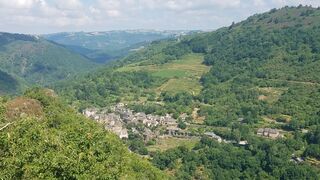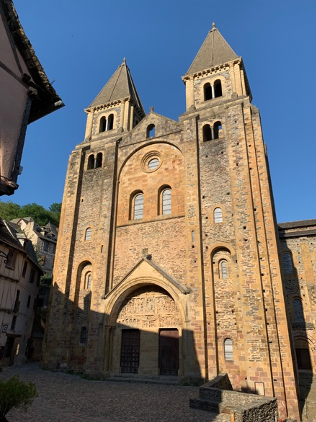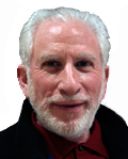
This is a story about African emigrés, young men and women survivors having fled to France for asylum from their respective country’s tyranny and torture. It is also a story about kindness, how one act of kindness begets another.
I met these scarred yet resilient young people in rural France, in an historic village called Conques. There were about 20 of them. They joined about a dozen "regulars" (like me and my wife) on a scheduled, weekly summer walk (a pélerinade) into the town’s surrounding forests.
The day was glorious. The sun was softened by a few nimbus clouds. A gentle breeze cooled the air. But it had rained heavily the night before. Half of the emigrés, as well as my wife and I, accidentally became separated from the lead group. We were lost in dense, ancient forest, like in a fairy tale. When we were able to reconnoiter and head back to the village, our path was laced with frequent, slick, downwardly pitched switchbacks.
I couldn’t manage the descent, starting to weaken and slip. My walking stick and hiking boots offered little help. A couple of the African young men offered me a hand. But my pride had me say, no merci, ca va, it’s OK. But it wasn’t.
Then the largest of the young African men, over six feet tall and solidly built, climbed back up the trail and approached me. He knew what needed to be done—and didn’t ask. He simply stepped towards me and firmly took my arm to assist me. His was an act of pure kindness.
A couple of days later, in the evening, we went to an outdoor area in the village set with folding tables and chairs. There would be the firing up of the ancient bread oven, built into a support wall of the town. Pizzas, even a leg of lamb, were being prepared.
It was there I saw all the young Africans again, the survivors of human trafficking. They had been shepherded to Conques by a trio of 20-something French women, all young journalists living in the Paris area. This was not the first group they had brought, nor would it be their last. They urged me to speak with Cécile Allegra, their boss, and famed documentarian.
I learned from them that my Good Samaritan’s name is Abdou (changed for anonymity), born and raised in Ethiopia. He was abducted after crossing the Eritrean border and taken to a ransom camp in the Sinai. When these camps were bombed (reportedly to prevent escapees from entering Egypt), he then was transported, imprisoned, and tortured further for three more years in camps in Libya, where human trafficking had vastly proliferated.
The Sinai kidnapping camps were estimated to be 20 in number. Their aim was to extract ransom, sometimes as much as $50,000, from the usually impoverished families of their captives. The camp guards would call the family on cell phones, subjecting them to tortured screams by their child or other family member. The gangs’ ruthless message was, “…pay or death will be certain, but not without further, great misery."
This "industry" of capture, torture, and ransom has now moved to Libya, where its magnitude is considered enormous, with an estimated 600,000 prisoners, escapees from Ethiopia, Eritrea, Sudan, Somalia, (southern, tribal) Kenya, and the Republic of Congo, Nigeria.
All these countries have one thing in common—they are dictatorships. Those that flee do not do so to find "economic opportunity." That's a whitewash because the reality is that these young people are running away from their homelands to survive. Once they cross any border, they cannot go back; and if deported back to their homeland, all hell would await them. A one-way street. Quantifying the death toll from the huge network of Libyan camps eludes human rights observers because when bodies are scattered in the desert, they perish with no trace.
The skeins of this story began to further reveal themselves in the days after the village dinner.
I learned about Voyage en Barbarie (Under The Skin: A Journey Into Savagery, 2014), Allegra’s documentary. I spoke with her about the film, which continued her reporting on human trafficking. Her film had won the prestigious Alfred Londres Prize and depicts the chilling stories of a few young Eritrean men who, fleeing tyranny, are captured after they crossed the border into Sudan.

The Abbaye that centers Conques has 7 “Brothers” (priests of the Prémontré Order founded in the 12th Century). One of the younger Brothers, Frrère Adrien, had read a story in Le Monde reporting on the industry of human trafficking. He imagined that Conques, Christians, and faiths everywhere could be of service to the victims of these barbaric practices. Fr. Adrien soon discovered, online, the work of Cécile Allegra. He arranged to meet Allegra in a Paris café, a long train ride from this village, joined by his Abbaye Superior, Fr. Cyrille. The question they would bring was, “What can we do?"
Adrien and his fellow Brothers decided to put on two events in Conques in the summer of 2015. One was a two-day seminar, keyed off by screening Allegra’s documentary, attended by local, national, and international visitors, at the Centre Européen, a cultural venue near the top of the village. But the gamechanger, if you will, was the second event: a 3-month display of Allegra’s meter-square photographs, annotated with her text, portraying Eritreans in forced exodus from their native land. Over 500,000 pilgrims, tourists, and citizens (from throughout France and many other countries) viewed this portrayal of massive horrors against humanity. These public events set the stage for supporting the victims of trafficking by this tiny village: For further, intentional acts of kindness.
The first was the Conques village offering a home to an Eritrean family (who were living in Port Sudan), selected by the French government. In 2016, a mother, father and their four children, ages ten and younger, two boys and two girls, moved into a house at the entry of the town, bought by a newly established Conques association that raised the money to buy and refurbish it. They were the first black people ever to live in Conques. I have seen the children about Conques over the past few years, speaking French fluently and growing comfortable in this village so far—and different—from their homeland. The lives they have today stand as a beacon at a time when immigrants and refugees around the world are treated in monstrous ways.
The second was the creation by Allegra of Limbo, a NGO (a non-profit, non-government organization). Her epiphany came after one Eritrean survivor, a young man living near Paris, quietly hid in his room and starved himself for two weeks. He was discovered nearly dead and revived. Allegra had thought her public documentation and then assisting the trafficking victims in coming to France had been a success, which of course it was. But this man’s actions alerted her: That was not enough. While this man was out of the camps, the camps were not out of him.
Trauma of this sort is profound, deeply rooted, and stubbornly sustained in our minds and souls. Recovery requires ongoing safety, community, (often) psychological treatment, purpose, and meaning, and the restoration of dignity and hope.
Limbo’s mission would be to identify refugees in a state of "limbo" and at great risk to themselves, and then help them begin a path to new lives.
Conques’ dedication to kindness amplified. The Abbaye and the town community began to host groups of Limbo young men and women, for a week at a time, repeated many times each year. These were some of the young people I met, Abdou among them. The first group came to Conques in July of 2017, a refuge to foster resilience and enable them to leave their trauma and profound dislocations behind. No other French village is host to Limbo groups, not yet at least.
My report from France now comes full circle about intentional acts of kindness. It began with Abdou, in Conques for his second visit, emerging from the years of agony he was subjected to, who took it upon himself to deliver this older, white, American man from harm.
This story, like a parable, traces to his act of pure kindness (empathie in French). It is a tale about diverse people (and faiths) confronting a maw of inhumanity, and finding solutions blessed with grace. This chain will not likely end. Others, over time, will be the recipients of intentional acts of kindness—which, like love, beget themselves.
It was Theodore Roethke who said, “In a dark time, the eye begins to see.” And Charles Dickens who wrote, “A little key will open a very heavy door.”
There are so many doors about us, ready to be opened with the universal key of kindness.
I am thankful to my dear friend and colleague, Dr. Eva Lothar, for assisting in the reporting of this story.




